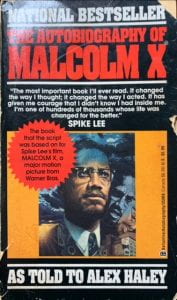The Autobiography of Malcolm X is a fascinating, mind opening, inspiring life story I would recommend for everyone to read. I would especially recommend it to current activists and those interested in America’s history of Racism, Civil and Human rights movements, injustice and inequity, Othering of Blacks by Whites, the de-humanizing effects of colonialism, Pan-Africanism, and comparative studies. Malcolm X offers the reader a unique take on America and the world through a brilliant intense critique from the perspective of a Black Nationalist, Muslim, highly influential leader. Malcolm X and Alex Haley reflect on Malcolm’s life from childhood until his assassination with this perspective in a way that can help the reader question everything in America, a country dominiated by Eurocentrism . As police brutality and white supremacy are as alive in America as ever, Malcolm X’s perspective is just as relevant now as it was then.
Before Malcolm X was the powerful human rights leader, he had spent time in prison after spending time as a hustler. He uses this time to transform into a powerful leader of the Nation of Islam and then one of Americas most influential Human Rights leaders and speakers, giving voice to Blacks in America and around the world. During this time in prison, Malcolm becomes obsessed with reading and studying books from the prison library. He begins to study the effects of colonialism and becomes critical of the White Eurocentric Bias of much history and literature, right down to the dictionary, in which he studies and interprets every word. Of this Malcolm says; “Book after book showed me how the white man had brought upon the worlds black, brown, red, and yellow peoples every variety of exploitation. I saw how since the sixteenth century, the so-called “Christian trader” white man began to ply the seas in his lust for African and Asian empires, and plunder, and power. I read, I saw how the white man never has gone among non-white peoples bearing the Cross in the true manner and spirit of Christ’s teachings– meek, humble, and Christ-like.
I perceived, as I read, how the collective white man had been actually nothing but a piratical opportunist who used Faustian machinations to make his own Christianity his initial wedge in criminal conquests. First, always “religiously”, he branded “heathen” and “pagan” labels upon ancient non-white cultures and civilizations. The stage thus set, he then turned upon his non-white victims his weapons of war” (X, Haley p. 176-177). Here we are reminded of the missionaries in Chinua Achebe’s book Things Fall Apart.
In the autobiography, Malcolm X criticizes and compares his perspectives with that of non-violent leaders like Martin Luther King Jr. and John Lewis. In an article in Teen Vogue Prince Shakur talks about how the characters in the popular recent film Black Panther mirror the leaders “Both Killmonger and Malcolm X learned to confront the systematic wrongs waged against black people globally while condemning internalized racism, whitewashing of history, and nonviolent direct action by black people. In contrast, the Black Panther, T’Challa, can be argued to resemble Dr. Martin Luther King Jr. As King, he is entrusted with the health and future of Wakanda, which he hopes to defend morally.” (Shakur, p.1 www.teenvogue.com)
Toward the end of his life, Malcolm X makes a pilgrimage to Mecca and travels to visit several African countries. Malcolm again begins to transform his thinking more in line with that of Homi Bhabha. The experience he has outside of America helps him to enter a sort of Third Space where he is able to see his own hybridization in the world and that he has to go beyond the cycle created by the colonizers for the colonized and into an international Pan-African approach. As he says “we Afro-Americans might remain in America, fighting for our Constitutional rights, but that philosophically and culturally we Afro-Americans badly needed to “return” to Africa –and develop a working unity in the framework of Pan-Africanism”(X, Haley p.350).
Shakur, Prince. “Black Panther” Mirrors the Duality of Martin Luther King Jr. And Malcolm X. (www.teenvogue.com) March 10, 2018
X, Malcolm, and Alex Haley. The Autobiography of Malcolm X. New York; Grove Press. 1992
